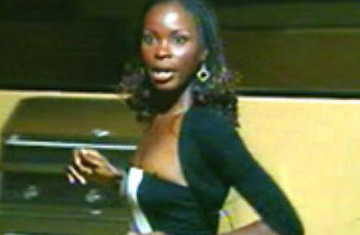
Maureen Namatovu, a Ugandan contestant on Big Brother Africa 2
A collective sigh of disappointment could be heard in bars and homes around Uganda seconds after Maureen Namatovu, the Ugandan contestant on the reality-TV program Big Brother Africa 2, was finally evicted from the show. The second African season of the series that helped make reality TV a popular format in the U.S. and Europe is captivating viewers throughout the continent with its tawdry language, free-flowing alcohol and sexual antics. Namatovu returned home to a war hero's reception, although her fan base is divided into two camps: those saddened that she did not win the $100,000 prize, and those glad she escaped the show's alleged cesspool of immorality.
"It's regrettable to see people leave their work and welcome a person who has been disturbing our morality," derided Nsaba Buturo, Uganda's Minister for Ethics and Integrity. Still, crowds of young Ugandans continue to fill dimly lit bars each weekend to monitor the lives of the show's participants, who hail from a range of African countries.
"It's good entertainment, so we can't completely dismiss it as immoral," rationalizes Arthur Rinaitwe, a 21-year-old student standing in the back of a packed rooftop bar-restaurant on a Big Brother night. His girlfriend, who had managed to grab a seat, nods vigorously in agreement. The couple come often to this venue known for its faux thatched roof, green foliage and towering statue of a giraffe. Up the winding bamboo steps are groups of men huddled around tables to watch a soccer game on one TV. An equally large, but mixed-gender throng has gathered on the other side of the bar to catch the season finale of Big Brother. The crowd is rapt with attention, often bursting into laughter or exclaiming at the screens.
As waiter Dan Zirimitusa darts among tables popping caps of beer bottles and serving food, he gasps: "There are more than 200 people coming tonight. Big Brother has been good for business." The bartender, wary of spies from competing establishments, immediately shushes him.
Big Brother Africa was launched three years ago and attracts millions of viewers each evening; the show has become one of the most popular television programs produced in Africa. South Africa-based satellite channel M-Net co-produces the show and broadcasts it to more than 1.2 million subscribers in 41 African nations. Though the majority of M-Net's subscribers are in South Africa, as only a tiny percentage of Africans own television sets, millions gather in clubs and restaurants across the continent to watch the real-life daily soap opera unfold. Television has succeeded where politics failed in creating a new Pan-Africanism, bringing together Africans not only on the screen, but also in the local dive. Proponents praise the program for bridging cultural gaps and eroding misconceptions that Africans of different nationalities hold of one another.
The show's success has not been without controversy. In 2003, the southern African country Malawi briefly banned Big Brother over what it called explicit sexual content that could corrupt the nation's youth. Uganda is still a deeply conservative nation, with laws banning homosexuality and abortion. Yet Ugandans are fascinated despite themselves by a Western-style show that showcases Africans engaged in commonly frowned-upon vices. Editorials appear weekly in local newspapers analyzing the latest sordid development.
As smoke wafts into the bar from a nearby grill, series fan Rinaitwe suggests: "Maybe the show should have a conduct code that is acceptable to society." But why would anyone want to watch that?
